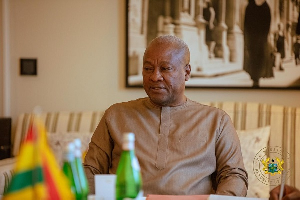A former Vice Chancellor of the University of Ghana, Professor Kwadwo Asenso-OKyere, has observed that the current curricular of most Ghanaian universities are failing to stimulate entrepreneurial creativity in students, thereby producing half-baked graduates who cannot transform the world around them.
Prof. Asenso-Okyere has accordingly recommended that the Ministry of Education needs to focus on developing a solution-based curricular for the universities which will seek to turn the youth into entrepreneurs and transformational individuals ready to take up challenges in the society. While he admitted that obstacles existed, he believed that entrepreneurial skill development would advance the economy and social development of the nation.
The university don was speaking in an interview with Public Agenda after attending the induction service of the Executive Council of the Great Commission Church International (GCCI) at the University of Ghana, Legon, recently.
He is currently the Development Policy and Capacity Strengthening Advisor to the Ghana Strategy Support Programme for the International Food Policy Research Institute, an international organisation with its West African regional office in Accra. It is tasked to reduce poverty and malnutrition in Africa.
Prof. Asenso-Okyere bemoaned the disconnection between the national agenda, the economic and industrial development on one hand and the educational policies which have affected the country's development.
“Though there are few Ghanaians doing well in their fields of endeavor, the challenges of economic and social underdevelopments have become swords of Damocles still hanging on the neck of the country's fortunes and these challenges can only be broken through an educational system that is developed around practical and creative knowledge.”
He was of the view that “a sustainable education must embrace a visionary approach that seeks to help people to understand the world better, face the future with hope and confidence, and help address the complex and interdependent problems that threaten the future and aspiration of the nation and its citizens.”
In a telephone interview , a former acting Director of the Ghana Education Service, Mr Kenneth Michael Nsowah, espoused similar views, saying that the various curricular being pursued in Ghana's universities were loaded with courses and programmes that were outmoded and could not provide students with skills and potentials to meet the demands of the contemporary problems.
Mr Nsowah noted that “the basic aim of education is to equip individuals to read and write and be able to think and work to earn a living while carrying out our Godly mandate of protecting the environment. That is crucial for the sustainability of human life.”
“With the current economic and social malfunctioning that have plagued governments the world over, sustainable education driven by practical and entrepreneurial-oriented curricula is needed to avert the turning out of graduates that are ill-equipped and incompetent in solving the problems affecting the world today.”
Mr Nsowah advised educational authorities, policy makers and industry players to be aware of the fact that, “our desire as a country to accelerate our pace of economic and social development and to reduce poverty, and to create wealth through a knowledge-based economy and society must come with commitment and deployment of our educational energies and resources to the building of knowledge-based societies whose individuals are creative, innovative and entrepreneurial minded in strengthening the socio-economic frontiers of Ghana's development”.
He has called upon the Curriculum Research and Development Division (CRDD), one of the twelve (12) Divisions of the Ghana Education Service (GES), to conduct a research into impact analysis of the current curricula and offer advice to educational authorities in developing a, workable and practical curricular whose content can transform and shape potentials and skills of students who can change the world around them.
General News of Saturday, 7 September 2013
Source: Public Agenda

















